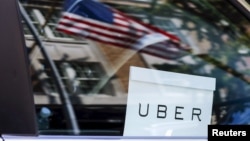Uber Technologies Inc was sued on Tuesday by disability rights groups and wheelchair users accusing the ride-sharing company of violating New York City human rights laws by failing to make enough of its vehicles accessible to disabled people.
The proposed class-action complaint said Uber engaged in "pervasive and ongoing discrimination" because people in wheelchairs can use only a few dozen of its more than 58,000 vehicles in the city.
Given Uber's growing popularity, this "substantially undermines" the benefits of New York City's commitment to make half its yellow taxis wheelchair-accessible by 2020, according to the complaint filed in the state Supreme Court in Manhattan.
"I want to be treated like everybody else," Valerie Joseph, 41, a Queens Village, New York resident born with spina bifida with hydrocephalus and one of the plaintiffs, said in an interview. "We are normal people, and we have lives."
In a statement, Uber said its technology "has expanded access to reliable transportation" for people with disabilities, and that it "will continue advocating for a solution that offers affordable, reliable transportation to those who need a wheelchair accessible vehicle."
The complaint said Uber provides wheelchair-accessible rides through its UberWAV service, but fewer than 100 vehicles in its city fleet offer it. It seeks to require Uber to provide "full and equal access" for people who need accessible transportation.
"Riders either face very long wait times or can't get rides at all," Rebecca Serbin, a staff attorney for Disability Rights Advocates, said in an interview. "The human rights law reflects the City Council's commitment to accessibility. Uber is flagrantly violating that law."
The case follows similar lawsuits against Uber in Chicago and Washington, D.C.
It adds to problems affecting the San Francisco-based company, which has been beset by complaints about its workplace culture, a federal inquiry into software to help drivers avoid police, and an intellectual property lawsuit by Waymo, the self-driving car unit of Google parent Alphabet Inc.
The plaintiffs in Tuesday's lawsuit also include the Brooklyn Center for Independence for the Disabled, Disabled in Action of Metropolitan New York, the Taxis for All Campaign, and Brooklyn resident Gabriela Amari.
Joseph, who works at the Axis Project gym in Manhattan, said that without Uber, she sometimes has to book rides on accessible buses or trains in advance, and the rides can take hours.
"When I'm at a job and my boss needs me to get somewhere on demand, I can't," she said.
The case is Brooklyn Center for Independence for the Disabled et al v. Uber Technologies Inc et al, New York State Supreme Court, New York County, No. 156434/2017.





